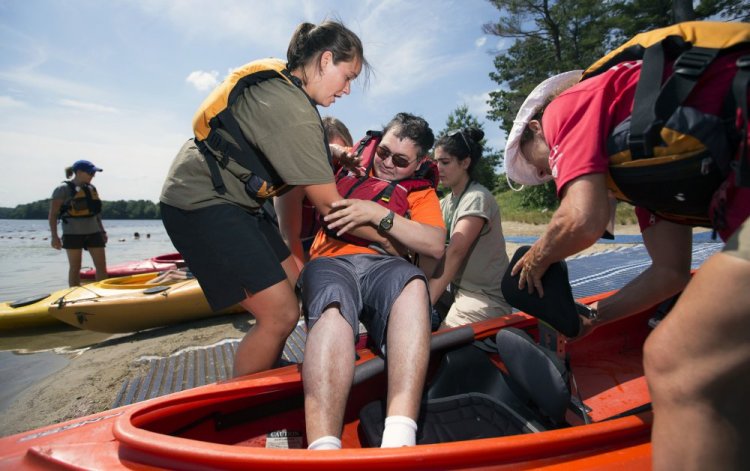NATICK, Mass. — Kitty Stein has had multiple sclerosis, limiting the use of her arms and requiring her to use a power wheelchair for much of the past 40 years.
But twice a week each summer at state parks in Massachusetts, Stein said she feels completely free when kayaking with an adaptive paddle that allows her to use her weak arms. She said the events run by the Massachusetts Department of Conservation and Recreation are the only time she is truly independent.
“It’s close to my home, so I do as many as I can. DCR does so many things,” said Stein, 69, of Lincoln, Massachusetts. “I want to do more of their events. I’d like to go skiing.”
More than 300 times a year, Massachusetts’ Universal Access Program helps people with disabilities sail, paddle, hike, bike, golf, ski and skate on state parkland.
The program has an annual budget of $1 million and a full-time staff of seven. An additional six guides are hired in the summer. About $750,000 was spent on the program each of the past four years, and another $250,000 a year was spent on accessible outdoor features at state parks, said Tom McCarthy, the program’s founder and director.
McCarthy said the program exists through a combination of general fund money, grants, public-private partnerships and fundraising.
“They’re all things you have to do to keep it going,” McCarthy said.
‘THE DEMAND IS THERE’
In a storage garage in Amherst, Massachusetts, the program has about 50 adaptive bicycles, as well as six all-terrain wheelchairs that allow participants to move up mountains and over logs. There are nearly 40 kayaks with adaptive outriggers and pontoons to stabilize paddlers, and also transfer benches that allow paddlers to move from a wheelchair to a kayak on their own.
“It promotes independence. So they can get into the kayak without anyone touching them,” said Matt Mitchell, the program’s equipment manager. “Others love getting help from our guides.”
The equipment travels around Massachusetts to programs held at state parks, attracting as many as 100 at a time. Participants also come from surrounding New England states, McCarthy said.
“What we could do if we had unlimited resources,” McCarthy said. “The demand is there.”
Back in July, participants arrived in the parking lot at Cochituate State Park to find a Universal Access Program tent and Program Coordinator Laila Soleimani ready to give instructions. They were asked to fill out a waiver and pay a $5 fee, and then were shown the wheelchair-accessible mat laid across the beach to several kayaks.
Those who needed help were lifted by guides into a kayak and secured with adaptive equipment. Soon after they launched into Lake Cochituate, located 20 miles west of Boston.
“It increases confidence, socialization. It helps reduce anxiety,” Soleimani said.
RESPONSIVE TO PARTICIPANTS’ FEEDBACK
Stein loves to be outdoors and spend her time gardening in her yard. But she’s also traveled with John Langell, her partner of 35 years, to the ADA trails in Massachusetts, such as two in Groton.
She first learned of Massachusetts’ accessible outdoor program in 2012. She knows of no other program like it.
“I think of states as offering recreation areas,” Langell said. “But in terms of programs for the disabled this never occurred to me. And they take our feedback. They have a different attitude. They don’t act like they know better than we do. There is some humility. They are very attentive.”
One of the program’s seasonal guides, LeeAnn LaRue, 60, is a former physical education teacher whose daughter has mobility limitations as the result of a brain tumor. LaRue looks for outdoor adventures she and her daughter can enjoy together, but said unfortunately there are few outside Massachusetts.
“Often (participants) say they never thought they’d be able to do this,” LaRue said.
Send questions/comments to the editors.




Comments are no longer available on this story